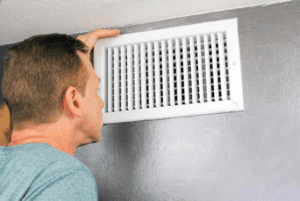 Poor Indoor Air Quality Can Affect Your Health
Poor Indoor Air Quality Can Affect Your Health
How does indoor air quality affect your health? Your home’s indoor environment can significantly impact the health and well-being of you and your family. Poor indoor air quality exposes you to harmful pollutants and toxins. These hazards can trigger allergies and ailments ranging from headaches and eye irritation to chronic diseases like cancer.
For the health and comfort of those you care about most, prioritize the air in your Columbus residence. CJS Heating & Air provides professional HVAC services. These services offer comprehensive solutions to purify the air in your home.
A pristine indoor environment, free of harmful pollutants and contaminants, is critical to individual well-being and daily health. Particulate matter such as dust, dander, mold, and secondhand smoke can infiltrate the home. They accumulate in the air we breathe and threaten all occupants’ respiratory health and overall wellness.
People prone to adverse reactions or existing conditions may experience severe consequences from bad indoor air quality. Install a comprehensive air purification system to prevent these risks. This system should be able to remove dangerous particles and provide medical-grade clean air for the living space.
Indoor Air Pollution: Risks and Solutions
Chronic exposure to concentrated indoor air pollutants poses grave health risks, especially in tightly-sealed, poorly-ventilated spaces. Poor ventilation causes toxic particles and gases to accumulate. Poor ventilation creates a hazardous environment that harms us gradually. Fresh outside air is essential to dilute and circulate these toxins.
Implementing adequate ventilation and filtration systems that minimize prolonged exposure to concentrated indoor air pollution is critical.
We can improve living and working spaces. This can be done by taking proactive measures to enhance indoor air quality. These measures include proper ventilation, filtration, and circulation. Implementing science-based strategies to minimize pollutants and maximize fresh air is critical to safety, well-being, and optimal cognitive performance.
How Pets Can Affect Indoor Air Quality
Pets bring joy and companionship to our homes. However, their presence also introduces airborne contaminants and pests. These can degrade indoor air quality. However, with proactive measures, pet owners can mitigate these effects and maintain a healthy home environment.
Regular grooming, high-efficiency air filters, diligent cleaning practices, and pest control are all steps that individuals can take. These steps will help them recognize and reduce the impact of pet-related pollutants. Pet owners can benefit from owning a pet without sacrificing their home’s cleanliness. To do this, they must be knowledgeable and follow the best practices.
What are some types of contaminants?
Maintaining high indoor air quality is essential for a healthy home and workplace. However, various influences—from daily routines to construction materials—can compromise the cleanliness of internal environments. Pollutants released by burning substances are harmful, emitting toxic gases that quickly saturate enclosed spaces.
Minimizing your health risks is critical. Avoid indoor activities that produce smoke or fumes, such as lighting solid fuels or smoking cigarettes. By being mindful of how our actions affect the air we breathe inside, we can cultivate spaces that nourish well-being.
Material selection and rigorous cleaning protocols are critical for construction or renovation projects. The items used in construction projects can emit hazardous volatile organic compounds and other poisonous chemicals. These chemicals can reduce indoor air quality.
Biological contaminants, including mold, mildew, and allergens, are also readily spread in indoor spaces under construction. Choosing sustainable, low-toxicity materials and implementing intensive cleaning protocols is essential. Using this approach helps to reduce pollutants and ensure the safety of those living in the building.
A maintenance plan is essential for constructing a facility. This plan should cover the entire operational lifetime. Such a plan enables the creation of a safe and productive space that brings peace of mind.
Some examples of contaminants that are in homes:
- Allergens – Don’t let their size fool you – tiny particles can pack a big punch for allergy sufferers. Lingering on fabrics for months and even spreading through the air, these pesky irritants can trigger a troublesome immune system response.
- Carbon Monoxide – Carbon monoxide is a highly toxic gas from familiar household sources such as cars and furnaces. It can harm anyone, regardless of age or health. Installing efficient ventilation systems in all combustion devices is essential to avoid the dangers of carbon monoxide buildup. Don’t take any chances with this hazardous gas – safeguard your health today.
- Lead – Lead is commonly known for powering vehicles and coloring homes. Lead is a versatile metal with unique properties that drive innovation in various industries. However, its ubiquitous use can also harm indoor air quality.
Other examples of contaminants include:
- Mold – No one is entirely immune to decay and its harmful impact. Moist environments are highly conducive to fungi growth, requiring homeowners to keep their living spaces dry. Preventive measures against dampness are crucial to curb the proliferation and dissemination of these microscopic organisms.
- Formaldehyde – A component frequently used in home furnishings, known for its pungent odor and potential cancer-causing effects. It is in various materials, including pressed wood, cabinets, flooring, carpets, and fabrics. Consumers must understand that formaldehyde is also present in adhesives, paints, and coatings.
- Pesticides – Pesticides are a powerful defense against pests that can threaten the health of your plants. Defending against bugs, weeds, and other intruding organisms is essential. However, it is crucial to remember that pesticides can harm indoor air quality. Therefore, cautiously handling pesticides becomes necessary to stay safe while protecting your plants.
- Smoke – Smoke and various combustion processes often contain toxic chemicals such as formaldehyde and lead. These dangerous pollutants can be present in multiple sources, including cigarettes, cookstoves, and wildfires. Exposure to these substances poses a serious health risk for individuals.
Ensuring cleaner and safer indoor air is vital for maintaining a healthy living and working environment. We can reach our goal by reducing activities that emit pollutants.
Additionally, we should be aware of the materials used in construction and renovation. We can reduce the risk of health issues due to poor air quality by prioritizing indoor air quality. This will create a more productive and comfortable environment indoors.
Improved Home Air Quality with Tailored Solutions
Discover tailored solutions to improve the air quality in your home by contacting our team of expert professionals. We have years of experience in advanced sealing techniques. This enables us to block off hazardous substances effectively. Additionally, we can adjust gas stoves to reduce harmful emissions.
Don’t let poor indoor air quality affect your health. Our solutions are innovative. They will help you create a healthier and more comfortable living space. You won’t need to sacrifice convenience. Don’t wait – contact us today to learn more about how we can enhance your home’s air quality.
Ensure Clean Indoor Air with HVAC Filters
Don’t let poor indoor air quality affect your health – ensure your HVAC system filters are clean. Breathing clean air is essential for an optimal lifestyle. Air filters are crucial components that help keep harmful contaminants and particles out of your home.
Air filters are especially critical for persons with preexisting lung conditions such as asthma and young children. Activating the recirculation mode on your HVAC system can help protect your indoor environment.
This is especially important when outdoor pollution levels are high. It allows you to keep the air in your home free from external pollutants. Protect your health and breathe easy with clean air filters.
Investing in an efficient air purifier is a wise decision that can provide numerous benefits. Reducing harmful bacteria and allergens in your home can help improve your indoor air quality.
This will ensure that the air in your home remains at its best. Ensure the cleanliness of your indoor air by using HVAC filters and purifiers. Trust us to help you breathe clean and healthy indoor air.

